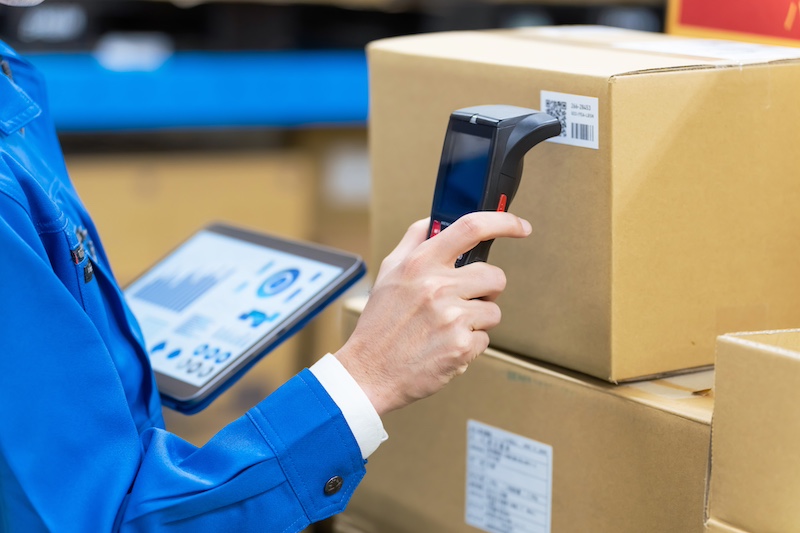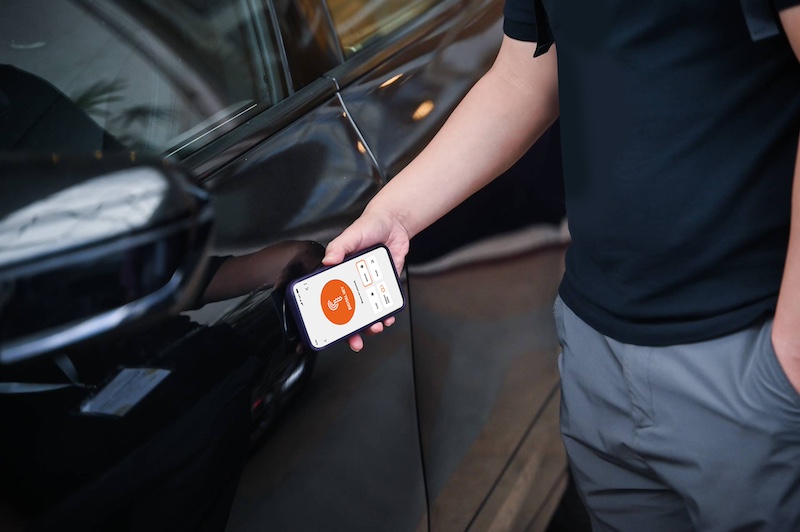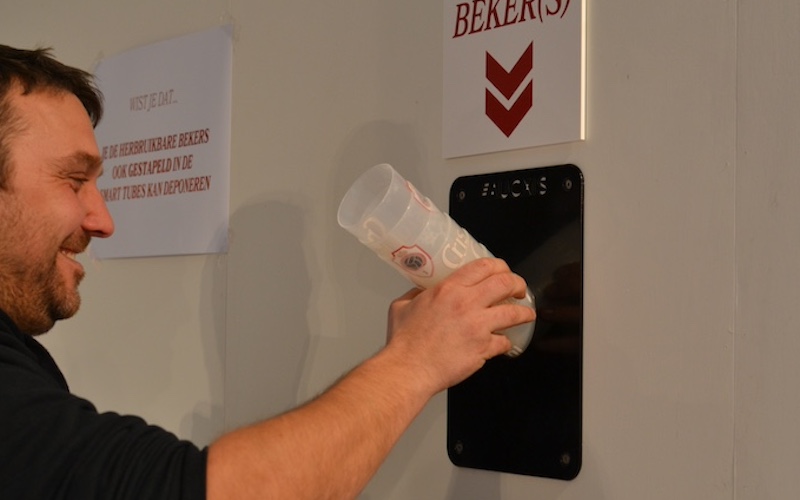Royal Antwerp FC Scores Reusable Cup Solution with RFID
Thousands of football fans at Belgium’s Royal Antwerp Football Club (RAFC) matches are drinking their beers in reusable cups and returning those cups for a deposit refund, with the help of RFID technology.
According to the football club, the solution that launched in February has cut wait times at its stadium bars and helped it meet a sustainability mandate by eliminating single-use beverage cups that were previously purchased with the drink and tossed into the trash.
Now cups are returned, washed and reused as RFID tracks the processes and ensures proper reimbursement.
RAFC is Belgium’s oldest football team, with 16,000 fans at each home game, and a total of 1.6 million drinks consumed each year. In mid 2023, the European Union announced a directive to end single-use plastic cups, which meant a major transition for the club.
Karel Verlinden, RAFC’s hospitality manager, said as soon as the EU directive was announced, the started investigating the best operation for the facility.
Aucxis RFID Solutions
The team’s hospitality service went to Aucxis RFID Solutions to acquire a system a system for asset tracking.
They developed Sustainable Tracking of Assets for Reuse (STAR) in collaboration with RAFC, to provide a solution that can be used by other EU companies transitioning from single-use plastic, based on the new rule. RAFC had reviewed the available technology-based options and selected the STAR system for its reliability.
The STAR solution includes RFID tags on the bottom of each reusable plastic cup, readers throughout the stadium, and cloud-based software, integrated with the team’s existing POS system.
Testing Technology and Modifying Stadium Spaces
The football club first launched its test phase in September 2023. “After extensive testing, we went live across the entire stadium in February 2024,” said Verlinden.
Deployment required some reconfiguration of space as the club repurposed several small spaces into refund points, strategically located between bars and the stadium exit.
RAFC installed a total of 26 RFID reading tubes to read tagged cups being returned by fans in the stadium, all located close to bars and exits. They are so close, in fact, that an individual only has to walk a maximum of 25 meters to a cup-return tube. The number of tubes per bar was adjusted based on the turnover at each bar, tracked by the team’s point of sale (POS) system.
GS1 UHF RFID tags are applied inside the reusable cups during the production process by DeSter the cup supplier. These cups and the tags on them will survive more then 150 wash cycles. Additionally, RAFC hired a third-party company to wash, sort and then transport the reusable cups back to the stadium bars for reuse.
How it Works
The process starts when fans inside the stadium go to the bar and place their drink order, using their credit or debit account to pay for the order as well as to pay a deposit for the cups. A bartender then fills the cups—each with an RFID tag attached to its bottom.
As the filled drink cup is handed to the customer, it passes over an RFID antenna which captures the tag ID and links it to that customer’s account. the STAR solution integrates with the POS system, Weezevent.
The patron then takes the cup with them and when they finished their drink, they can go to the nearest return kiosk or “tube” where they insert the cup. The RFID tag on the cup is then read as it passes through the tube into a collection bin, and the deposit amount is automatically returned to the account linked to that ID.
The cup then goes to the third-party washing area where RFID readers again capture the tag ID for that cup and update its status as cleaned and ready for reuse in the software.
Gaining Benefits
RFID helps the company track when and how often the cups are used. And with that data, captured at the washing area, “we can perfectly monitor the lifespan of all cups. With this information, we can place more targeted reorders with DeSter in Hoogstraten,” said Verlinden.
Since the system went live, the return rate for used cups is high, according to officials. Verlinden commented “we know exactly what percentage of all cups are correctly returned; according to Belgian law, this must be at least 95 percent.” With the Aucxis STAR system, he said, “we easily reach 97 to 98 percent.”
The system is also fraud-proof, according to Verlinden. “We can perfectly track how many cups are sold and how many are actually scanned at the antennas next to the cash register,” he said.
If there are large discrepancies, he said, the company can intervene to prevent potential fraud such as an individual receiving drinks they didn’t pay for.
“Most importantly, [patrons] who purchases the cups gets their deposit back, regardless of who deposits the cups in the tube” Verlinden said.
Integration with POS System
Developing the solution required considering some challenges, recalled John Kluskens, Aucxis’ account manager.
The system needed to be designed for the fast-paced, high-volume environment of European football—”pouring drinks even during the peak periods such as halftime and post-match, where ensuring smooth and efficient return processes is crucial,” Kluskens said.
The technology needed to be implemented to seamlessly integrate with the club and stadium’s existing infrastructure and operations.
Training Provided
Additionally, Aucxis provided training to help staff as well as fans understand the new system and prevent any resistance to change. “The system’s ease of use…requires no additional effort for adoption,” he said.
To familiarize fans with the new system, the football club invested in communication and visibility in the stadium. Complaints after matches are rare, and we only hear positive feedback from both supporters and staff.
While deploying the STAR system, Aucxis collaborated with Royal Antwerp Football’s system partners, including Weezevent for the cash register system and DeSter as the cup supplier, to develop and implement an innovative solution tailored to the club’s needs.
Addressing Environmental Challenges
DeSter integrates the RFID tags securely into the cups to prevent them from loosening or detaching after multiple wash cycles, which could potentially compromise their functionality and data integrity.
“This is crucial to maintain the reliability and effectiveness of the tracking and management system over time,” said Kluskens.
Aucxis focuses on developing robust hardware and software solutions capable of accurately detecting and tracking tags, even in a high-moisture environment. Prior to deployment, extensive testing was conducted to validate the durability and performance of the RFID tags and hardware in various liquid environments.
Meeting Expectations
Verlinden said the system has not only enabled the transition to reusable cups, but has made customers service faster, with shorter queues at bars, so that football fans can get back to the match faster.
The system has room for growth. The tubes can process more cups than are currently being processed so that there will be no need to add tubes or antennas.
“Making changes to the system is not currently on the agenda. Everything works perfectly and as expected,” Verlinden said.
-

PacSun to Expand RFID Pilot This Summer
Executive extolls success of program in more accurate inventory count
More efficient antennae have turned the used of RFID turning it into a “game changer”2024-06-04
-

CCC Companies Building Standardized NFC Car Access
The Digital Key standard includes near-field communications (NFC) that allows car companies to offer a short-range solution for phone-to-car communication
NFC is among technologies that can be detected wirelessly, by a car’s locking system when an authorized smartphone is in the vicinity.2024-06-04
-

Royal Antwerp FC Scores Reusable Cup Solution with RFID
The Belgian-based football team needed to meet a sustainability directive from the European Union related to eliminating single-use plastic cups.
The solution known as STAR, from Aucxis, has reduced queueing time for football fans, reduced labor at the bar and eliminating cup waste.2024-06-04
-

Using RFID, JSW Steel Cuts Truck Dwell Times at Factories
The RFID and AI solution from Kemar Automation enables JSW Steel to track the status of the trucks that enter and leave its facility at each step in the loading, unloading and weighing process.
The company can use the system to better plan its dispatching and other operations.2024-06-04










